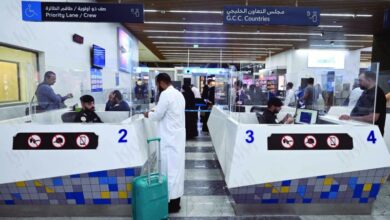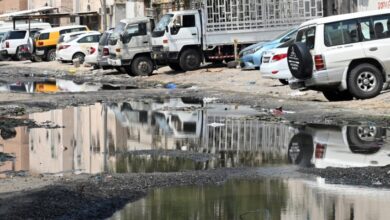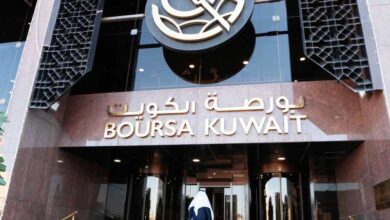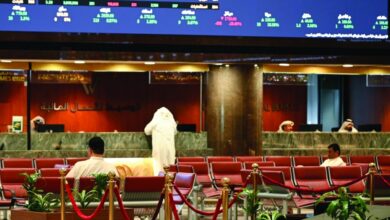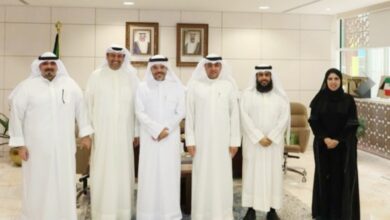
The Lebanese parliament elected Army Commander Joseph Aoun as President, following more than two years of vacancy, driven by intense international and regional pressure. Joseph Aoun election comes amid the weakening of Hezbollah and Iran, particularly after the fall of their key ally, Bashar al-Assad’s regime in Syria, and the broader geopolitical shifts that have affected Lebanon’s stability.
Following H. E. Joseph Aoun’s election as Lebanon’s President, His Highness the Amir Sheikh Meshal Al-Ahmad sent a congratulatory cable to the new president, expressing his sincere congratulations and wishing him “all success and guidance for the good, interest, and stability of the brotherly country.” The Amir also encouraged Aoun to direct all his energies and capabilities toward advancing Lebanon and achieving the growth, progress, and prosperity it seeks.
His Highness praised the “historical and distinguished relations” between the State of Kuwait and the Lebanese Republic, emphasizing the shared aspiration to strengthen these ties and expand cooperation across various fields for mutual benefit. His Highness wished for the Lebanese state and its people continued progress and development, and extended his wishes for the president’s good health and wellness.
For his part, His Highness the Crown Prince Sheikh Sabah Al-Khaled sent a congratulatory cable to President Aoun, expressing his sincere congratulations on the occasion of his election. His Highness prayed to God Almighty to grant the president good health and wellness, continued success and guidance and for security and stability to prevail throughout the brotherly country.
His Highness the Prime Minister Sheikh Ahmed Al-Abdullah also sent a similar congratulatory cable to President Aoun, extending his heartfelt congratulations on the occasion of his election.
With Aoun’s victory in the presidential elections, he becomes the 14th president of Lebanon and the fifth army commander to assume the presidency, following Michel Aoun, Michel Suleiman, and Emile Lahoud. Notably, he is the first president to come from southern Lebanon.
Parliament Speaker Nabih Berri and Hezbollah, who had strongly opposed Aoun’s candidacy in recent months, initially tried to send a political message by thwarting his election in the first round, where he received 71 votes. However, they later shifted their stance and partially supported him in the second round, where Aoun received 99 votes out of 128, a comfortable margin, though still less than the two-thirds required, which amounted to 86 votes.
The first session was attended by diplomats, including French envoy Jean-Yves Le Drian and Saudi envoy Yazid bin Farhan, along with international ambassadors from the five-member committee concerned with the presidential file, namely the United States, France, Saudi Arabia, Egypt, and Qatar.
Washington, Riyadh, and Paris played a significant role in securing Aoun’s presidency through a combination of pressures, incentives, and guarantees. These efforts culminated in recent days with visits from US envoy Amos Hochstein, followed by Saudi envoy Yazid bin Farhan and French envoy Jean-Yves Le Drian.
After taking the constitutional oath before the deputies, President Aoun delivered a speech in which he acknowledged ascending to office amid a “regional earthquake that changed regimes and may change borders.”
He pledged to uphold Lebanon’s positive neutrality, distancing it from alignment with the Iranian axis, and emphasized restricting arms to the state, which he stated should be solely responsible for liberating the south and deterring Israel—a clear message to Hezbollah, the only Lebanese faction retaining weapons under the pretext of “resisting Israel.” President Aoun also promised to discuss a defensive strategy, a framework previously proposed for integrating Hezbollah’s weapons into the state. Notably, his speech avoided any mention of the term “resistance.”
President Aoun called for “changing the political performance in Lebanon” and building a state founded on inclusive participation under the state’s umbrella. He emphasized the need to “affirm the state’s right to monopolize the carrying of weapons” and rejected reliance on external forces to create internal divisions. President Aoun also pledged to work on passing a law guaranteeing judicial independence and stressed that “there are no immunities for a criminal or a corrupt person.”
President Aoun emphasized his commitment to controlling and demarcating Lebanon’s borders in the south, east, and north with Syria, fighting terrorism, and implementing international resolutions. He pledged to rebuild areas damaged by recent Israeli aggression and reiterated Lebanon’s rejection of the permanent settlement of Palestinians. Additionally, he promised to engage in “serious and equal dialogue” with Syria to address pending issues, particularly the matters of missing and displaced Syrians.
The next president and his government face significant challenges, including rebuilding areas destroyed in the recent war in the south, east, and southern suburbs of Beirut, and implementing the ceasefire agreement that mandates Israel’s withdrawal from occupied southern areas while adhering to UN Security Council Resolution 1701. This resolution requires Hezbollah to stay away from the border, disarm all armed groups in Lebanon, and restrict weapons to legitimate state forces. Additionally, the government must address urgent economic reforms to recover from more than five years of unprecedented economic collapse.
Congratulations poured in for President Aoun, who moved to the Baabda Presidential Palace, reopened after remaining closed for over two years since the end of Michel Aoun’s term. The Custodian of the Two Holy Mosques, King Salman bin Abdulaziz, and Crown Prince Mohammed bin Salman extended their congratulations, while French President Emmanuel Macron hailed the election as a step toward reform. The US Ambassador to Lebanon expressed her pleasure at the development, and US envoy Amos Hochstein described it as a “great day.”
Iran welcomed Aoun’s election, but its ambassador to Beirut, Mojtaba Amani, emphasized the importance of adhering to “the people, the army, and the resistance,” a formula notably absent from the new president’s speech.
In the details of the news:
In a step aimed at restoring constitutional life to Lebanon, the Lebanese parliament yesterday elected army Commander Joseph Aoun as President, ending a more than two-year vacancy in the presidency.
The session to elect Joseph Aoun took place amid intense international pressure on Lebanese political forces, following a devastating war that weakened Hezbollah and the collapse of its ally Bashar al-Assad’s regime in neighboring Syria.
Hezbollah and its main ally, the Amal Movement, had strongly opposed Aoun’s nomination in recent months.
Joseph Aoun became the 14th president of the republic and the fifth army commander to assume the presidency, following Michel Aoun, Michel Suleiman, and Emile Lahoud. Since the end of the civil war, six presidents have succeeded each other, four of whom were military, alongside Elias Hrawi and Rene Moawad, who was assassinated before taking office.
The term of the president in Lebanon is six years, and a person may not be re-elected to the position until at least six years have passed since the end of their previous term.
Two rounds of voting
In the first round, Aoun received the support of 71 out of 128 MPs, while 37 voted with blank ballots, including 30 votes from the Shiite duo, Hezbollah and the Amal Movement led by veteran Parliament Speaker Nabih Berri. Additionally, 20 ballots were deemed invalid, including those from the Free Patriotic Movement bloc, led by Gebran Bassil, which voted for “sovereignty and the constitution.”
In the second round, held two hours after the first, Aoun received the votes of 99 deputies, while only 9 voted with blank ballots and 14 were invalidated, including 12 that read “sovereignty and the constitution.” The first session was attended by diplomats, including French envoy Jean-Yves Le Drian, the Saudi envoy, and ambassadors from the five-member committee overseeing the presidential file, including US Ambassador Lisa Johnson.
International Pressure
International pressure to elect Aoun reached its peak in recent days with visits from US envoy Amos Hochstein, Saudi envoy Yazid bin Farhan, and French envoy Jean-Yves Le Drian. Al-Akhbar, a newspaper close to Hezbollah, published on its front page yesterday, “The outside orders: The leader is your president,” accompanied by a picture of Aoun.
Al-Akhbar had previously launched scathing campaigns against Aoun during the war between Hezbollah and Israel, which lasted for more than a year. Meanwhile, the Saudi envoy held several meetings with Berri’s political aide to find a solution, as Berri had a list of demands concerning the next government, appointments to top positions, reconstruction in the south, and guarantees for Hezbollah.
Oath Speech
After taking the constitutional oath before the deputies, President Joseph Aoun delivered his oath speech, stating that he had reached the presidency “after a regional earthquake.” The most prominent part of his speech was his pledge to maintain Lebanon’s neutrality, as it had recently been seen as part of the Iranian axis. He also vowed to restrict arms to the state, making the state alone responsible for liberating the south. Additionally, Aoun promised to pass a law for the judiciary and to refrain from interfering in its affairs.
In his inauguration speech, Aoun stressed that “the political performance in Lebanon must change,” adding, that it was his pledge to the Lebanese wherever they are, and for the whole world to hear, is that today a new phase in Lebanon’s history has begun. He will be the first servant to preserve the charter and the National Accord Document, and to exercise the full powers of the President of the Republic as a fair judge between the institutions.
President Aoun stressed that if they want to build a country, they must all be under the rule of law and the judiciary, affirming that interference in the judiciary is prohibited, there are no immunities for criminals or corrupt people, and there are no mafias, drug smuggling, or money laundering.
President Aoun pointed out that it was his my pledge is to cooperate with the new government to pass the draft law on the independence of the judiciary, and to challenge any law that violates the constitution. His pledge is to call for parliamentary consultations as soon as possible to choose a prime minister who will be a partner, not an opponent, noting that they will rotate first-class positions within the state, and they will restructure the public administration, and he will work to confirm the state’s right to monopolize the carrying of weapons.
President Aoun stressed that they will invest in the army to control and secure the borders in the south and demarcate them in the east and north, fight terrorism, implement international resolutions, and prevent Israeli attacks on Lebanon.” He also emphasized, that he will ensure the activation of the work of the security forces as a basic tool for maintaining security and enforcing the laws, and will discuss a comprehensive defense strategy at the diplomatic, economic, and military levels, which will enable the Lebanese state to remove the Israeli occupation and deter its aggression.
The new president stressed that he pledges to restore what the Israeli enemy destroyed in the south, the suburbs, the Bekaa, and all parts of Lebanon, considering that it is time to bet on Lebanon’s investment in foreign relations, not to bet on the outside to bully each other.
President Aoun pointed out that they reject the settlement of Palestinians, and affirm their determination to assume the security of the camps, and will practice a policy of positive neutrality, and will only export the best products and industries to countries and attract tourists. He also called for the beginning of a serious and equal dialogue with the Syrian state to discuss all the relations and pending files between us, especially the file of missing and displaced Syrians.
President Aoun continued that Lebanon is committed to a free economy and need banks where the only ruler is the law. He will not be lenient in protecting depositors’ money. President Aoun promised to push with the next government to develop election laws, and I will work to pass the draft law on expanded administrative decentralization.
President Aoun stressed that he pledges to activate social safety nets, protect the media, and invest in science. There is no room for wasting time or wasting opportunities.
President Aoun addressed his comrades in arms, saying that he is proud to belong to the military institution, the school of honor, sacrifice, and loyalty, and he will not let the army and the military institution down, noting that there are many workshops, and he pledged to work with everyone to defend the public interest and the rights of the Lebanese.
Ceasefire
Observers and analysts believe that the role required of the army in the next phase to implement a ceasefire between Israel and Hezbollah was a decisive factor in tipping the balance in favor of the army commander.
The United States, France, and the United Nations are supervising the mechanism for implementing the ceasefire. The agreement stipulates that the Israeli army will withdraw from the areas it entered in southern Lebanon during the war, with the Lebanese army deploying in its place. Hezbollah must withdraw its forces to the north of the Litani River, located about 30 kilometers from the border, and dismantle any military infrastructure there. The Lebanese army is supposed to ensure that these sites are dismantled.
Since the conclusion of former President Michel Aoun’s term in October 2022, the Lebanese parliament has failed to elect a president in 12 sessions, with Hezbollah, the dominant political and military force, continuing to push for its candidate, Suleiman Franjieh.
Hezbollah suffered a significant setback in its conflict with Israel, which led to the destruction of much of its arsenal and the loss of several key leaders, including Secretary-General Hassan Nasrallah. This defeat compelled the group to agree to a ceasefire.
Franjieh, who had close ties to Assad, announced the day before yesterday that he was withdrawing in favor of the army commander.
The next president and the government they form will face significant challenges, chief among them the reconstruction of areas devastated by the recent war, including parts of the south, east, and southern suburbs of Beirut.
Additionally, they will need to implement the ceasefire agreement, which includes adherence to UN Security Council Resolution 1701 issued in 2006. This resolution mandates that Hezbollah stay away from the border and that all armed groups in Lebanon, except for the legitimate forces, be disarmed.
Another critical challenge will be implementing urgent reforms to revive the economy, which has endured over five years of unprecedented collapse.
Overcoming the constitutional amendment controversy
Several Lebanese MPs, including those from the Free Patriotic Movement led by Gebran Bassil and opposition change MPs, voiced their opposition yesterday to electing Army Commander Joseph Aoun as President of the Republic. They argued that such a move would violate the constitution. Article 49 of the Lebanese constitution prohibits first-class officials, including the Army Commander, from being elected during their term of office, as well as for two years following their resignation or cessation of their duties.
The electoral law for military personnel also stipulates that they must have been out of service for six months before running for any political office. However, in 2008, following the “May events,” in which Hezbollah took control of large parts of Beirut using its weapons, a settlement in Doha led to the election of Army Chief General Michel Suleiman as president. This came after the country had experienced a presidential vacuum since the end of Emile Lahoud’s term in 2007.
At that time, the Lebanese Parliament used Constitutional Article 74 to bypass the amendment to Article 49, citing the exceptional electoral circumstances.
In the session held yesterday, Speaker Nabih Berri referred to a legal review, arguing that Army Commander Joseph Aoun’s receipt of more than two-thirds of the votes effectively constituted an implicit constitutional amendment.
According to the constitution, any amendment requires the approval of two-thirds of the House of Representatives—86 votes out of 128. If Aoun had failed to secure 86 votes or more, it would have raised questions about the constitutionality of his election.
Source: Al Jarida











